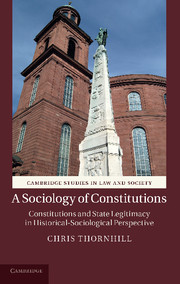 A Sociology of Constitutions
A Sociology of Constitutions Book contents
- Frontmatter
- Contents
- Acknowledgements
- A note on texts and translations
- Introduction
- 1 Medieval constitutions
- 2 Constitutions and early modernity
- 3 States, rights and the revolutionary form of power
- 4 Constitutions from empire to fascism
- 5 Constitutions and democratic transitions
- Conclusion
- Bibliography
- Index
2 - Constitutions and early modernity
Published online by Cambridge University Press: 07 September 2011
- Frontmatter
- Contents
- Acknowledgements
- A note on texts and translations
- Introduction
- 1 Medieval constitutions
- 2 Constitutions and early modernity
- 3 States, rights and the revolutionary form of power
- 4 Constitutions from empire to fascism
- 5 Constitutions and democratic transitions
- Conclusion
- Bibliography
- Index
Summary
Constitutions and the rule of law at the end of the Middle Ages
The fact barely needs emphasis that in late medieval societies European states did not increase their jurisdictional power or reinforce their ability to separate statutory acts from local custom and agreement in a linear or conclusive fashion. Many later medieval societies were endemically afflicted by lawlessness, and many societies, especially in the fifteenth century, witnessed a forfeiture of state authority through civil war and internecine strife. Nonetheless, in most European societies with relatively established political structures the centralistic constitutions of the high medieval period did not disintegrate in the later Middle Ages, and the last decades of the medieval era witnessed both a renewed growth in the positive statutory power of the law and an increase in the uniformity and concentration of legal order. Indeed, in much of Europe the latter period of the Middle Ages experienced the formation of more strictly organized monarchies, which renewed and reinvigorated the centralizing tendencies discussed in Chapter 1.
- Type
- Chapter
- Information
- A Sociology of ConstitutionsConstitutions and State Legitimacy in Historical-Sociological Perspective, pp. 77 - 157Publisher: Cambridge University PressPrint publication year: 2011
